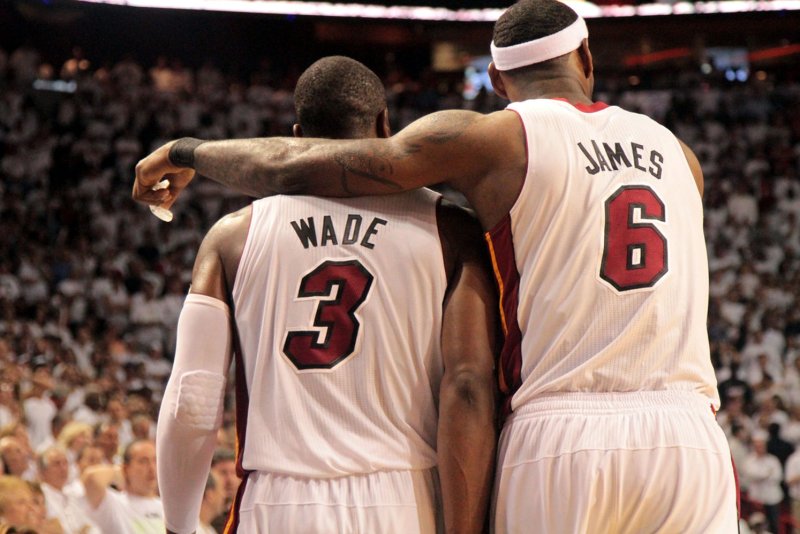Lebron James and Dwayne Wade have a history of shared success, winning multiple championships together, but when they forced joined forces in Miami, it took time for them and their teammates to develop chemistry. Photo by UPI/Susan Knowles |
License Photo
Dec. 4 (UPI) -- New analysis of both professional sports and online gaming results suggests past shared success increases the odds of victory in team competitions. In other words, team chemistry matters.
"There's a general sense in sports about the importance of 'team chemistry,' but it's a nebulous concept," Noshir Contractor, a professor of behavioral sciences and industrial engineering at Northwestern University, said in a news release. "We wanted to be more rigorous about how we think about team chemistry. Psychology has shown that when you enjoy success together, you learn more from the experience, so we focused on players who played together on winning teams."
To quantify the importance of team chemistry, Contractor and his colleagues first compile play statistics from a several professional sports leagues: the NBA, English Premier League, India's professional cricket league, the Indian Premier League and Major League Baseball. Researchers also analyzed game logs for Defense of the Ancients 2, a multi-player, team-based battle game played online.
Using stats from each league's multiyear dataset, researchers established skill ratings for each player based on individual performance. Contractor and his colleagues also tallied each time players experience a team win together. Their analysis identified players who repeatedly experienced success together.
Finally, researchers used linear regression modeling to identify which factors best predicted a team's likelihood of success. Models showed the the combination of both total team skill and past shared success, or team chemistry, was a better predictor of team success than skill level alone.
"We looked at the results and thought, 'Is this too good to be true?'" Contractor said. "We even tested the robustness of the findings by using alternative measures of individual player statistics used to compute skills variables, and the results held up."
Contractor and his research partners shared the results of their study this week in the journal Nature Human Behavior.
According to the researchers' models, even baseball and cricket teams -- sports defined by isolated individual performances -- require chemistry for success. The data also showed team chemistry predicted the success of groups of computer game players, many featuring teammates who had likely never met in person.
Contractor thinks the findings have implications beyond sports. He is currently working with NASA on organizing the right combination of astronauts to boost group performance on space-based missions.
"Once you've gained as much as you can from bringing the right people together, you have to look for the next competitive advantage," Contractor said. "Whether it's in the workplace of the future on Earth or in deep space, understanding the relational predictors of team success is going to be very important."















